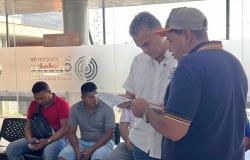Acute Respiratory Infection (ARI) is the most common infection in children, it occurs suddenly and lasts less than two weeks; Most of these diseases, such as the flu and the common cold, are mild, but depending on the general state of health of the person, they can become complicated and become life-threatening, as is the case with pneumonia. In order to learn more about this topic, the District Administration, through the Ministry of Health*, provides recommendations to prevent respiratory diseases in children under five (5) years old, during the rainy season.
The panorama
During the year 2024 (until the month of May), the collective report of outpatient consultations (outpatient and emergency) in Medellín, due to respiratory infection, is 171,377 consultations, of which 32,548 are for children under five (5) years of age, corresponding 19% of total consultations.
Regarding hospitalizations, 2,832 cases have been registered, which is equivalent to 39% of ARI hospitalizations in the District (9,031).
To date, 492 boys and girls (31.4%) have been hospitalized in the ICU of the total of 1,544 records in total.
The viruses that most cause these infections were respiratory syncytial virus, COVID 19, rhinovirus and parainfluenza A.
Recommendations.
How to prevent a child or older adult from getting sick?
- Maintain the complete vaccination schedule
- Intensify hand washing with soap and water
- Avoid contact with people who have the flu or cough
- Sneeze or cough into the inner corners of your arms and wear a face mask or mask (children over three years of age and adults)
- Avoid the presence of smoke inside the places where the child stays and facilitate ventilation, lighting and cleaning of the same.
- Avoid exposing yourself to sudden changes in temperature
- Promote breastfeeding in children under six (6) months
When to consult the doctor?

Generally, the flu can be treated at home with the necessary care, however if you experience any of the following symptoms you should go to the doctor immediately:
Children under two (2) months
- If you breathe faster than normal
- If your appetite decreases
- If you have a fever, even once
- If your chest sounds when you breathe
- If you feel drowsy or do not wake up easily
- If you have seizures or seizures

From two (2) months to five (5) years
- If you have a fever that is difficult to control higher than 38.5 °C for more than three days and remain depressed while the fever subsides
- If you breathe faster than normal
- If your ribs sink when you breathe
- If you can’t eat or drink anything or vomit everything.
- If you feel drowsy or do not wake up easily
- If you have seizures or seizures
- If you have discharge or bad odor from the ears

Over five (5) years old
- If you experience suffocation or difficulty breathing
- If you have chest pain when breathing or coughing
- If there is weakness or excessive fatigue
- If you have a fever that is difficult to control greater than 38.5 ºC for more than three days
- If there is yellow or bloody expectoration

How to care for a child if he or she suffers from an acute respiratory infection?
- It should not be sent to the garden, school or college and should avoid places with many people
- Wash your hands frequently with soap and water
- Manage fever greater than 38.5ºC according to medical guidance. Apply warm water cloths to areas of the body with the highest concentration of temperature such as the armpits and groin folds; never use alcohol for this purpose
- Increase fluid intake and offer foods in small portions more frequently
- Give breast milk more frequently if you are an infant
- Keep the child sitting for at least 30 minutes after each meal
- Provide only the medications that were prescribed by the doctor, in the established doses and schedules and for the indicated time
- Clean the nose frequently, leaving it free of secretions or apply saline solution through the nostrils.
- Use a mask in the presence of symptoms (children over three years of age and adults)
- Cover the child’s mouth and nose when the temperature changes, especially at night and in the morning.

*Spokesperson: Allen Londoño, Undersecretary of Public Health | Rita Elena Almanza Payares; Epidemiology leader.












